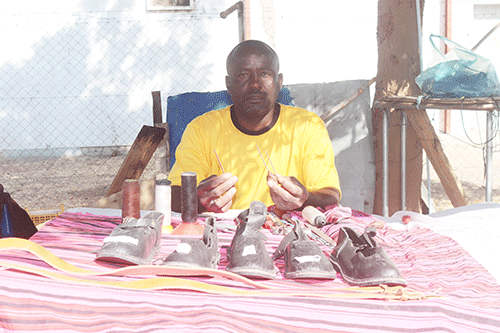Fourie Nhoni-Shuuya
Johannes Kalumbu (57), a craftsman from Onhokolo village in the Omusati region, is seeking assistance from the government and the business community to invest in his dream.
Kalumbu is in need of production machinery to produce various leather items such as shoes, belts and bags, thus getting his business off the ground.
As a young boy, he started forming shoe-like statues from the sand while boys his aged enjoyed the sport of football. His talent was undeniable, and his teachers praised him for making himself a pair of shoes made from Makalani tree leaves (eembale).
Kalumbu then moved to Windhoek to perfect his craftsman skills. He joined Tulihongeni Pamwe shoe repair in Katutura which was then owned by a German lady, who gave him an opportunity to go to South Africa for an internship programme. That was in the early 90s. On his craftsman journey, he met a businesswoman from Oshakati, Linda Naikaku, who found interest in his skill and offered to cover his tuition at COSDEC in Tsumeb, where he learned about leather tanning and the process of softening leather.
For more than a decade, Kalumbu has been trying to secure funding for the machines from different offices such as the Ministry of Gender Equality and Social Welfare (MGESW), but his efforts proved futile.
“I have tried approaching different ministerial offices in the region, but I have not yet received a promising answer. In 2016, the MGESW had a programme of giving machines to small-scale entrepreneurs. I applied, but did not receive the call that could change my life for good,” he stated.
He currently uses low-cost manual needles made from sewing needles and hard, melted plastic to manufacture his products, individually sowing each stitch by hand. He hopes that good Samaritan will see the potential of his skill and make an investment that will better not only his life, but also empower those who have valuable skills like himself. “My biggest dream is not only to produce quality products which meet the needs of my community, but to cater beyond the borders of the region. The machinery will enable me to produce more school shoes and cater for vulnerable learners who cannot afford a basic necessity such as school shoes,” he continued.
Kalumbu currently sells a pair of leather school shoes for N$300. He also offers shoe repair services at the Outapi Open Market, hoping that one day, his skill will be appreciated by investors.
* Fourie Nhoni–Shuuya is an information officer for the MICT in Omusati.


